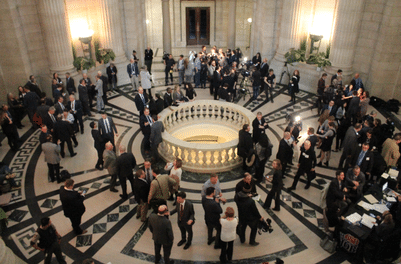- Forecasted summary deficit of $521 million this fiscal year. Last budget forecasted an $840 million deficit. To get there meant reductions in some areas, such as a close to 1.0% reduction in the operating grant to universities and colleges, and a $150 million budget to budget reduction in highways spending. Growth, Enterprise and Trade saw one of the biggest budget to budget reductions, a decrease of close to 6.0%.
- On the revenue side, helping shrink the deficit was an 8.0% increase in federal transfers, equal to $333 million. While those increased transfers helped, federal income tax changes contributed to a $263 million hit to income tax revenues in the 2017-2018 fiscal year, resulting in the 2018 budget forecasting a $176 million decline in income tax revenues from what was forecasted in the 2017 budget.
- The deficit would have been ever lower if the province had not committed $50 million back into the Fiscal Stabilization Fund. This will leave the fund with $175 million as of March 31, 2019, a marked improvement from the $115 million it was sitting at on March 31, 2017.
- Debt servicing costs are forecasted to hit $1.034 billion. This is the first time the province will spend over $1 billion just to service provincial debt. Due to years of increased government borrowing, compounded by two credit downgrades and rising interest rates, that debt servicing cost is up from $855 million in 2016. That is an over 20 per cent increase, close $180 million dollars. It’s money that could have built around five new schools, or cut the payroll tax in half.
- The budget increased the small business income deduction to $500,000, bringing Manitoba in line with the majority of Canadian provinces. This longstanding Chamber recommendation will mean up to $6,000 in tax savings for each Manitoba small business.
- The revenue eligibility cap for the small business venture capital tax credit was lifted, and the minimum investment threshold was halved to $10,000. This means more companies and investors will be able to take advantage of the credit. However, processing times also need improvement. A credit holds little value if funds can’t be moved efficiently out the door.
- A new Child Care Centre Development Tax Credit will provide up to $10,000 per new infant or preschool childcare space created by a corporation whose primary activity isn’t childcare. This credit will be claimable over five years, and there is an initial limit of 200 spaces per year. This credit will hopefully stimulate the development of more childcare spaces.
- The budget revealed the $25 per tonne of greenhouse gas emissions carbon tax will come into effect of September 1. Gasoline will go up by 5.32 cents a liter, and the average household will pay on average $240 a year in increased fuel costs. To mitigate the cost, the government is raising the basic personal exemption (BPE) by $1,010 for each of the next two years. Barring any larger increases from other provinces this means Manitoba will have the fourth highest BPE of any province by 2020, and in dollar terms the $2,020 BPE increase will mean a $218 annual tax saving per Manitoban.
- While great for individuals, the budget offers little to help our trade exposed sectors, such as manufacturing and transportation, deal with carbon pricing.
- For a company with a 4,500 square metre warehouse (heated by natural gas) and five diesel trucks, this carbon price will add approximately $15,000 in direct annual costs. In addition companies will almost certainly be paying more on their inputs, as pricing carbon will increase input costs across the board.
- The Chamber was clear in our pre-budget submission that carbon pricing revenues had to help our trade exposed sectors, as their American competitors don’t face a carbon price.
- Revenues accrued should go to projects that reduce carbon emissions, which is the primary goal of pricing carbon as stated in the Manitoba Climate and Green Plan. Our pre-budget submission called for clear and transparent accounting of all carbon price revenues yet what will be done with millions of the $248 million annual provincial government tax take remain unclear.
Taken as a whole, Budget 2018 delivered a sound fiscal blueprint and positions Manitoba well on its road to fiscal recovery.
|
For further information on this and other Chamber advocacy initiatives, please contact Director of Advocacy, Michael Juce, at [email protected] or 204-944-3315.
|






